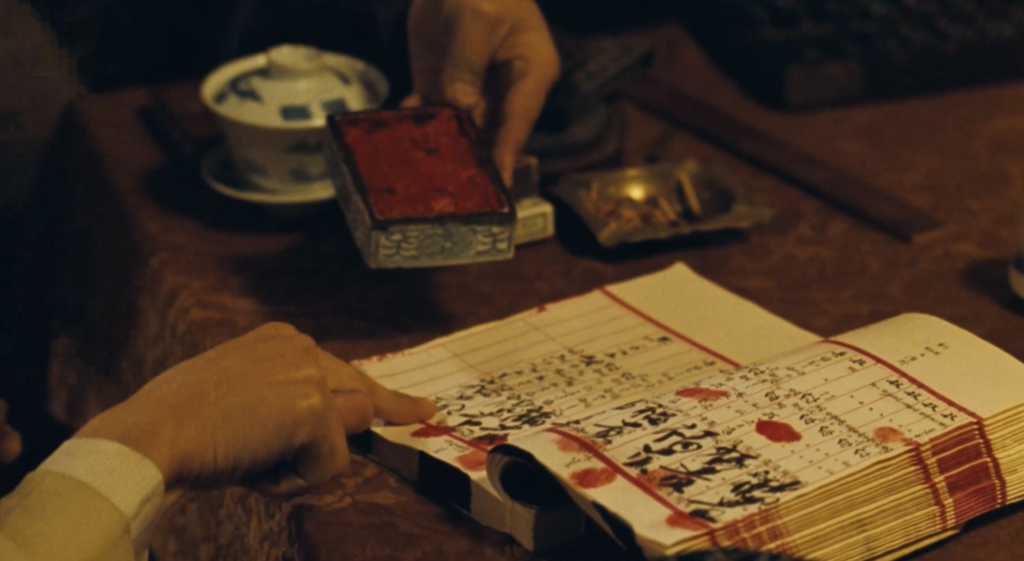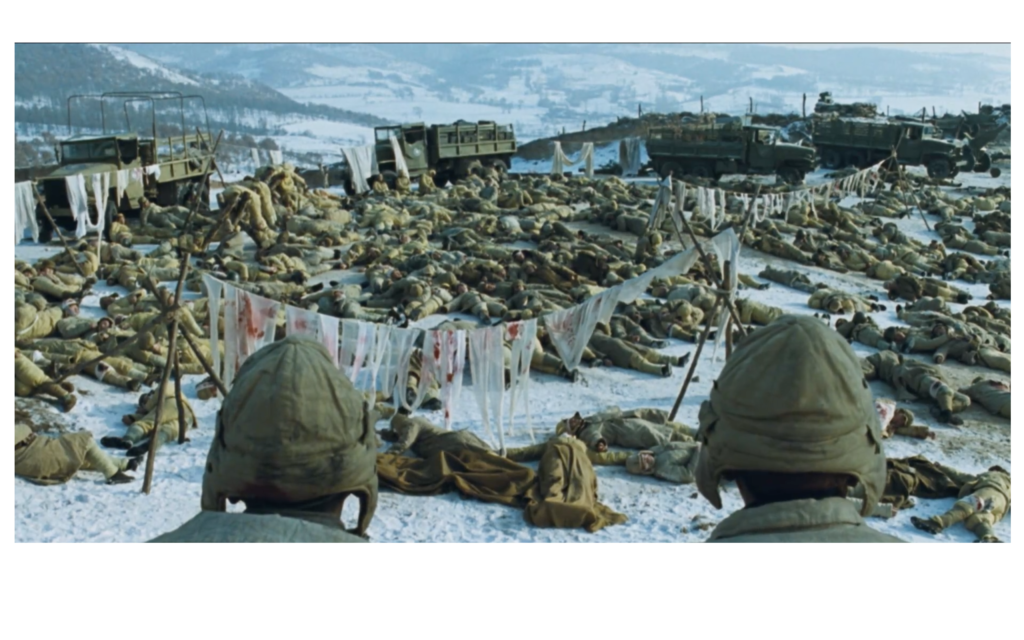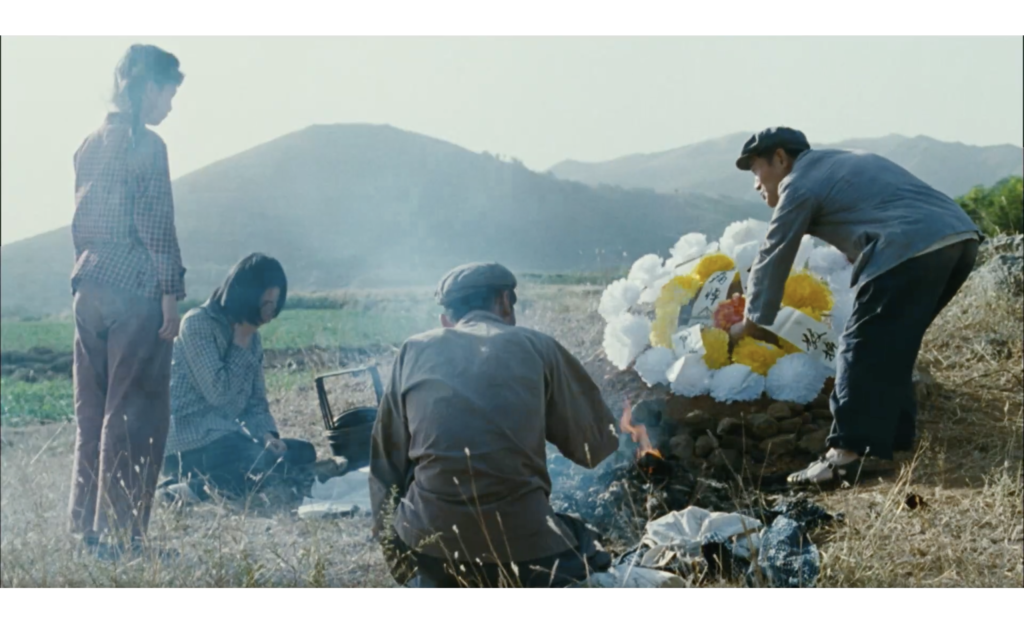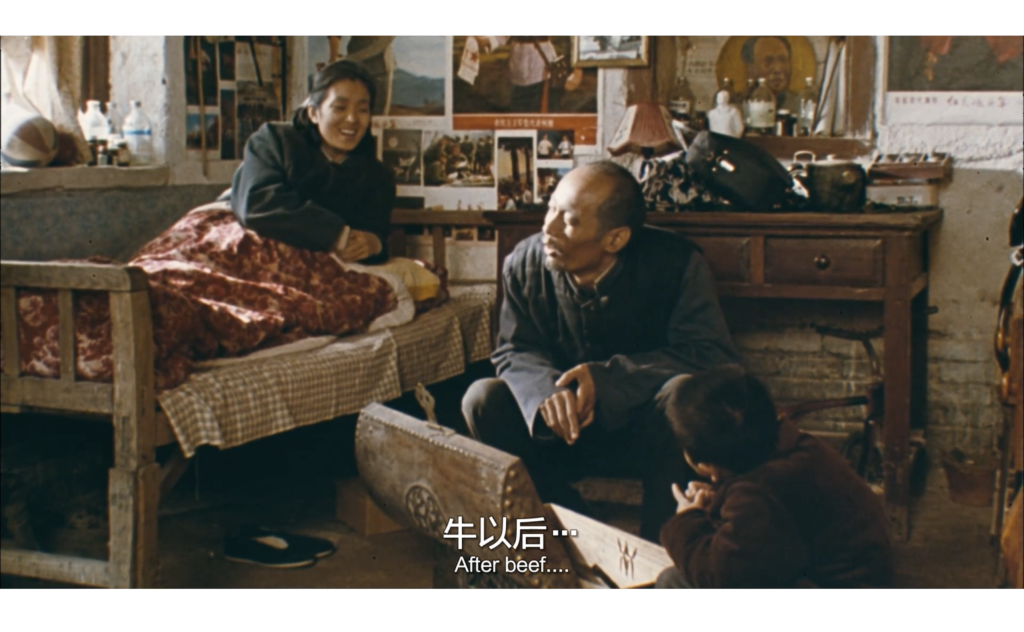“To Live” is a film adapted from the novel of the same name by Yu Hua; it tells the life story of the main character Fugui. Fugui was born into a very wealthy family, however, he was addicted to gambling, which caused him to lose all his wealth. For the rest of his life, he went through many significant historical events like the Chinese Civil War, the Great Leap Forward, and the Cultural Revolution. As he wandered through his life, he experienced some fortune, but the main theme of his journey remained a tragedy. Through the presentation of Fugui’s life, the movie critiques the policies of the Chinese Communist Party in that era and demonstrates the existentialistic struggles that led to Fugui’s transition from hedonism to nihilism.
The movie begins by presenting the audience with the image of a spoiled playboy who is gambling with another man. The playboy is Fugui and the other gambler is LongEr, LongEr and the casino owner conspired to win away Fugui’s ancestral home. The proficient actions of signing his name and stamping his fingerprint on the ledger seem as if he’s done it a million times. We can also see that the pages of the ledger are already filled with plenty of his gambling debts. He said with a self-mocking tone, “I have owed you much these days, that my handwriting has improved”. He quickly forgot about the money he had just lost and turned to watching the shadow puppet show. Fugui is an expert in shadow puppet shows, when he felt the performance wasn’t good enough, he walked up the stage and joined the performed a piece himself. This hobby is much healthier compared to gambling, and it would later become what he relies on to survive. In this scene, we see that those born with superior wealth condition possess access to most of the material(gambling) and spiritual(puppet show) privileges in life. During this period of life, Fugui had never experienced the suffering of life. Relying on his family’s wealth, he lived with no worries, and to him, the meaning of life was simply to indulge in entertainment, fully embracing the satisfaction life brought him. In this sense, Fugui is the perfect embodiment of the Cyrenaic Hedonism. This school of thought contends that people should pursue immediate, sensual pleasures; as the future is uncertain, so the pleasure at the present moment is what people should value the most. However, Fugui eventually lost all his wealth, and his father also died because of the anger from Fugui losing their ancestral home. This offers an aspect of critiquing the Cyrenaic hedonism, as the short-sighted nature of this theory failed to protect future well-being. Yet, later in the film, after the Chinese Communist Party took control, LongEr, the gambler who took away Fugui’s grand ancestral home, was classified as a landlord because of it and was sentenced to death by the communists. In this sense, the author is also acknowledging Cyrenaic hedonism by presenting how the future is indeed uncertain, and that Fugui’s pursuit of immediate pleasure turned out to save his life. This counterintuitive value sets an absurd tone that carries on throughout the film.

After Fugui lost his wealth to LongEr, LongEr lent him a shadow puppetry box. From then on, Fugui and his friend Chunsheng travelled from place to place, making a living from shadow puppet performances. However, such life soon came to an end as the Kuomintang army forced them to participate in military service. On the battlefield, Fugui and Chunsheng met an old soldier. They cuddled and slept together, barely managing to survive from the freezing cold. When the old soldier saw his friend’s clothes, he left them to look for his friend among piles of corpses. Later, the two surrendered to the Liberation Army(Chinese Communist Party). The Liberation Army treated their captives kindly, giving Fugui money to go back home. Chunsheng, however, chose to work for the Liberation Army as a driver. Although not explicitly stated, in such a harsh environment and intense battle, the old soldier most likely also died on the battlefield. Chunsheng pursued an ambitious life, this decision also led him to a life path of becoming a district mayor. Meanwhile, Fugui decided to pursue a simple and stable life. Despite once being in similar circumstances, their decisions lead him to completely different life paths. This presents the existentialist notion of freedom. That we’re not born into a pre-given nature and that the development of ourselves is based on our own decisions. We have the freedom to decide who we are. However, this freedom also comes with responsibility which we have to bear as we make choices. The karmas of Fugui’s choices are also frequently presented throughout the movie, for instance, how he lost his wealth from pursuing immediate pleasure.

After he returned from the battlefield, the Land Reform Movement had begun. This movement targeted the landlord class, the wealth of that class was dissipated and the people of that class were massacred. LongEr, who owns Fugui’s ancestral house, was classified as a landlord. Fugui witnessed how Long Er was paraded through the streets and eventually executed, this deepened his belief that the life as an ordinary peasant is the only way that allows him to survive in this turbulent society. This would be considered inauthentic, which Sartre refers to as “bad faith”. Fugui is over-identifying with his current struggles and denying his freedom to act on and pursue that luxurious life he used to enjoy. However, we cannot entirely blame Fugui for being inauthentic, as the political environment forbids the existence of any non-governmental body of mass wealth. The movie then continues to critique the political environment in that era, for instance, the Great Leap Forward. It is an economic movement aimed at transforming China into a socialist society through rapid industrialisation and collectivisation. During this time, people were forced to hand in pots and pants so that local governments could melt them down to meet unrealistic steel production quotas. Fugui was even commanded to hand in his shadow puppet box for the decorative metal on it. This absurdity emphasises the ignorance and desperation of the masses, driven by propaganda and fear. After that, the movie then moves on to the Cultural Revolution. It was a movement that aimed to purge the bourgeoisie element and reinforce the dictatorship of the proletariat. However, this movement soon got out of control, resulting in the persecution of intellectuals and traditional cultural practices. In the movie, the doctors of the hospital are all imprisoned in a cow barn, and they are replaced with students. Fugui’s daughter, Fengxia, had a haemorrhage during labour. The inexperienced students did not know how to save Fengxia. Meanwhile, Fugui found an old medical professor who had starved for days. To ensure he had enough energy to save Fengxia, Fugui brought him many steamed buns. The professor ate them all and was so stuffed that he fainted. Eventually, the students weren’t able to save Fengxia, she died but gave birth to Fugui’s grandson. The ignorance of the student and the gluttony of the professor wind up creating another grotesque scene. Through this, the film sarcastically critiques how the fervent pursuit of revolutionary ideals can obliterate individual lives, urging viewers to reflect on the human cost of political movements and the dangers of sacrificing personal and cultural identity for the sake of ideology. Not only did Fugui lose his daughter, but he also lost his son in a car accident, and the driver responsible for this accident was his friend, Chunsheng. It can be said that Fugui’s later life is almost a complete tragedy, however he continues to live his life. But meanwhile, he doesn’t seem to have any passion or pursuit beyond merely living his ordinary life, he is living just for the sake of living. This loss of meaning and absence of ambitions enhances the theme of nihilism in this movie.

Fugui once said to his son, “The little chickens will grow to be ducks, the ducks will become geese, and the geese will become sheep, and the sheep will become oxen, and tomorrow will be better because of communism.” Near the end of the movie, Fugui repeats the same line to his grandson, “The little chickens will grow to be ducks, the ducks will become geese, and the geese will become sheep, and the sheep will become oxen…” However, he then paused. This moment of hesitation demonstrated his disappointment towards the Chinese Communist Party. But at the same time, this also presents his perplexity. He is facing a typical rationale of nihilism, the combination of a belief which makes life meaningful and scepticism towards the belief. Fugui stopped believing in the communist society which used to represent hope, and lived for the sake of living itself. The movie focuses on the critique towards the history of the Chinese Communist Party and also the perplexity of one’s life in such a turbulent era. Through Fugui’s conversion from hedonism to nihilism, the author is conveying one message, that living is merely for the sake of living itself.

